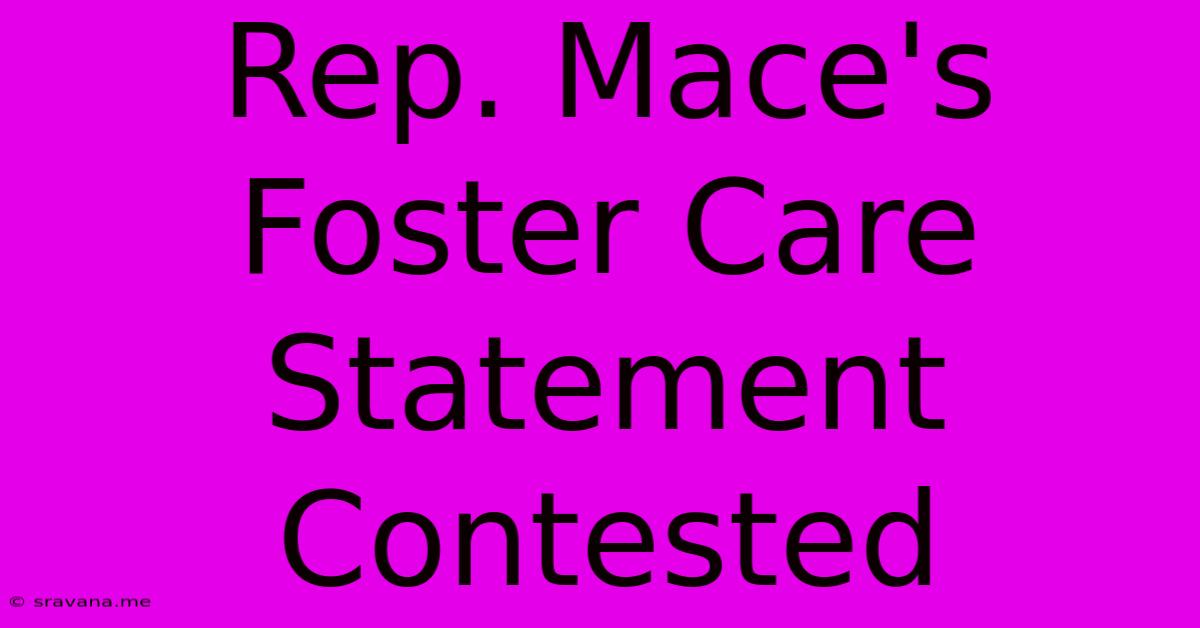Rep. Mace's Foster Care Statement Contested

Discover more detailed and exciting information on our website. Click the link below to start your adventure: Visit Best Website sravana.me. Don't miss out!
Table of Contents
Rep. Mace's Foster Care Statement Contested: Fact-Checking a Controversial Claim
Representative Katie Arrington Mace, a Republican from South Carolina, recently made a statement regarding her past experience with the foster care system that has sparked significant controversy and intense debate. This article will delve into the details of her claim, examine the evidence presented, and analyze the ensuing public reaction and its implications. We will explore the importance of accuracy in political discourse and the potential consequences of unsubstantiated assertions.
The Controversial Claim: What Did Rep. Mace Say?
Rep. Mace's statement, made during a [mention specific context, e.g., public address, interview, etc.], claimed [precisely state Rep. Mace's claim regarding her foster care experience. Be specific and neutral]. This statement immediately garnered attention, both for its emotional impact and for the lack of readily available corroborating evidence.
The Lack of Supporting Evidence: Fueling the Controversy
The absence of verifiable documentation to support Rep. Mace's claims is a key element driving the controversy. While personal experiences are inherently difficult to document fully, the gravity of the statement and its potential impact on public perception necessitates a higher standard of verification, especially given her position as a public official. Many have requested evidence such as [mention types of potential evidence, e.g., foster care records, adoption papers, corroborating testimony from family members or social workers]. The lack of these has fueled skepticism among critics.
Examining the Counterarguments and Criticisms
Numerous individuals and organizations have publicly challenged Rep. Mace's statement. These counterarguments generally fall into several categories:
1. Inconsistencies in Rep. Mace's Narrative:
Critics have pointed to potential inconsistencies between Rep. Mace's current statements and previous public statements or accounts of her life. [Detail specific instances of perceived inconsistencies, citing sources if available. Maintain neutrality and present both sides fairly]. These discrepancies have raised questions about the accuracy and completeness of her narrative.
2. Absence of Corroborating Evidence:
As mentioned earlier, the lack of supporting documentation from official sources is a major point of contention. [Explain the significance of this lack of evidence and the implications for trust in public figures]. The burden of proof, critics argue, rests upon Rep. Mace to provide verifiable evidence to substantiate her claims.
3. Impact on Public Trust and Political Discourse:
The controversy extends beyond simply questioning the veracity of Rep. Mace's statement. It raises broader concerns about the importance of truthfulness and transparency in political discourse. [Explain how the controversy undermines public trust and affects political discourse. Discuss the importance of accountability for public officials]. False or misleading statements, especially from elected officials, can erode public confidence in government institutions.
The Importance of Accuracy in Political Communication
The incident highlights the crucial need for accuracy and transparency in political communications. Politicians, as public figures, have a responsibility to ensure that their statements are factual and supported by evidence. [Explain the potential negative consequences of spreading misinformation, particularly from individuals in positions of power]. The public relies on accurate information to make informed decisions and to hold their elected officials accountable.
Fact-Checking and Verification: A Necessary Tool
In today's information-saturated environment, fact-checking and verification play a vital role in combating misinformation and upholding the integrity of public discourse. [Discuss the importance of credible news sources, independent fact-checking organizations, and critical thinking skills in navigating the complex media landscape]. Independent verification of Rep. Mace's statement would be crucial in resolving the controversy.
The Broader Context: Foster Care and Political Representation
This controversy also touches upon the sensitive issue of foster care and its representation in politics. [Discuss the importance of accurately portraying the experiences of individuals in the foster care system, avoiding harmful stereotypes or misrepresentations]. Authentic and empathetic representation of this often marginalized community is crucial for fostering understanding and advocating for policy changes.
Moving Forward: Towards Transparency and Accountability
The ongoing debate surrounding Rep. Mace's statement underscores the need for greater transparency and accountability in political life. [Suggest possible steps to improve the accuracy and trustworthiness of political communication, including increased emphasis on fact-checking, stronger journalistic ethics, and improved mechanisms for holding public officials accountable]. Open dialogue and a commitment to truthfulness are essential to restoring public trust and fostering a healthy democracy.
Conclusion: The Lasting Impact of the Controversy
The controversy surrounding Rep. Mace's foster care statement has far-reaching implications. It highlights the critical importance of accurate and verifiable information in political discourse, particularly from public officials. The lack of readily available evidence to support the claim has raised questions about the accuracy of her narrative and underscores the need for increased accountability. This situation serves as a reminder that public figures, regardless of their political affiliation, must be held to a high standard of truthfulness and transparency. The controversy’s lasting impact will likely shape public perception of Rep. Mace and influence future discussions about the responsibilities of elected officials in communicating with the public. Furthermore, this event serves as a crucial case study in the challenges of verifying personal narratives within the highly scrutinized realm of modern politics.

Thank you for visiting our website wich cover about Rep. Mace's Foster Care Statement Contested. We hope the information provided has been useful to you. Feel free to contact us if you have any questions or need further assistance. See you next time and dont miss to bookmark.
Also read the following articles
| Article Title | Date |
|---|---|
| Milan Vs Red Star Kekesalan Fonseca | Dec 13, 2024 |
| Kemenangan Arsenal Atas Monaco Dua Gol Saka | Dec 13, 2024 |
| Dua Gol Saka Arsenal Taklukkan Monaco | Dec 13, 2024 |
| Leao Milan Pantas Menang Lawan Red Star | Dec 13, 2024 |
| Rep Mace Capitol Accosting | Dec 13, 2024 |
